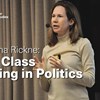blume
Rational choice and sociology
Pp. 872-877 in S.N. Durlauf and L.E. Blume (eds.) The New Palgrave Dictionary of Economics. Second Edition. Palgrave Macmillan.
Review of Elinor Mason’s Ways to be Blameworthy
Oxford University Press (2020) Abstract:In the moral responsibility literature, it is often said that blameworthiness presupposes wrongdoing. But there are numerous conceptions of both blame and wrongd is, to our knowledge, the first book-length attempt to spell out what the relevant kinds of wrongdoing and blame are that would make a strong connection between wrongdoing and blameworthiness plausible.
Jules Holroyd: Holding each other accountable for implicitly biased behaviour
Jules Holroyd, Assistant Professor at the Faculty of Arts at the University of Nottingham. ABSTRACTMany of us will have implicit racial biases: dispositions to certain affective or cognitive responses

Kasper Lippert-Rasmussen
I am professor in political theory and director of the Centre for the experimental-philosophical study of discrimination (CEPDISC) at University of Aarhus, Denmark. In recent years, I have worked mostly
Disillusionment and Anti-Americanism in Russia: From Pro-American to Anti-American Attitudes, 1993–2009.
International Studies Quarterly, Volume 62, Issue 3, p.534–547, doi.org/10.1093/isq/sqy013 Abstract In the early 1990s, the Russian public held overwhelmingly favorable attitudes toward the United States

Climate emotions and affective dilemmas. A psychological and philosophical study of their normative principles and the public's perceptions
An interdisciplinary projects that tries to understand the normativization of climate emotions. How "should" we feel about climate change?
Research seminar with Johanna Rickne: The Class Ceiling in Politics
Venue: Institutet för framtidsstudier, Holländargatan 13, 4th floor, Stockholm, or online.Research seminar with Johanna Rickne, professor of Economics at SOFI, Stockholm University.Register hereAbstracPrior studies have documented that working-class individuals rarely become parliamentarians. We know less about when in the career pipeline to parliament workers disappear, and why. We study these questions using detailed data on the universe of Swedish politicians’ careers over a 50-year period. We find roughly equal-sized declines in the proportion of workers on various rungs of the political career ladder ranging from local to national office. We reject the potential explanations that workers lack political ambition, public service motivation, honesty, or voter support. And while workers’ average high school grades and cognitive test scores are lower, this cannot explain their large promotion disadvantage, a situation that we label a class ceiling. Organizational ties to blue-collar unions help workers advance, but only to lower-level positions in left-leaning parties. We conclude that efforts to improve workers’ numerical representation should apply throughout the career ladder and focus on intra-party processes.

Johanna Rickne: The Class Ceiling in Politics
Research seminar with Johanna Rickne, professor of Economics at SOFI, Stockholm University Abstract: Prior studies have documented that working-class individuals rarely become parliamentarians. We kno








